
Amaranthaceae is a family of flowering plants commonly known as the amaranth family, in reference to its type genus Amaranthus. It includes the former goosefoot family Chenopodiaceae and contains about 165 genera and 2,040 species, making it the most species-rich lineage within its parent order, Caryophyllales.

The Celastraceae are a family of 98 genera and 1,350 species of herbs, vines, shrubs and small trees, belonging to the order Celastrales. The great majority of the genera are tropical, with only Celastrus, Euonymus and Maytenus widespread in temperate climates, and Parnassia (bog-stars) found in alpine and arctic climates.

Tasmannia is a genus of about 36 species of flowering plants in the family Winteraceae, and is native to Australia and New Guinea, with one species also found in parts of Southeast Asia. Plants in the genus Tasmannia are shrubs or small trees, usually dioecious with simple leaves, mostly white, sometimes yellow flowers, and one to many clusters of berries.
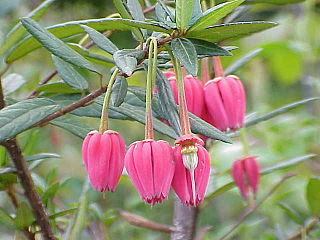
Elaeocarpaceae is a family of flowering plants. The family contains approximately 615 species of trees and shrubs in 12 genera. The largest genera are Elaeocarpus, with about 350 species, and Sloanea, with about 120.
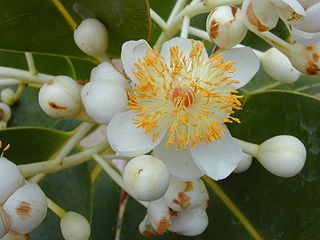
Calophyllum is a genus of tropical flowering plants in the family Calophyllaceae. They are mainly distributed in Asia, with some species in Africa, the Americas, Australasia, and the Pacific Islands.

Illicium is a genus of flowering plants treated as part of the family Schisandraceae, or alternately as the sole genus of the Illiciaceae. It has a disjunct distribution, with most species native to eastern Asia and several in parts of North America, including the southeastern United States, Mexico, and the Caribbean. General common names include star anise and anisetree. The genus name comes from the Latin illicere.

Caryocar is a genus of flowering plants, in the South American family Caryocaraceae described as a genus by Linnaeus in 1771. It is native primarily to South America with a few species extending into Central America and the West Indies.

Lacunaria is a genus of flowering plants in the family Ochnaceae native to Central America and tropical South America.
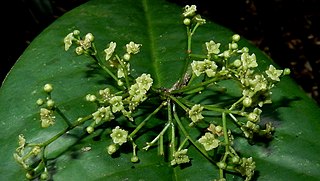
Tontelea is a genus of plants in the family Celastraceae.

Espeletia, commonly known as 'frailejones', is a genus of perennial subshrubs, in the family Asteraceae. The genus, which is native mainly to Colombia, Venezuela and Ecuador, was first formally described in 1808. The genus was named after the viceroy of New Granada, José Manuel de Ezpeleta.
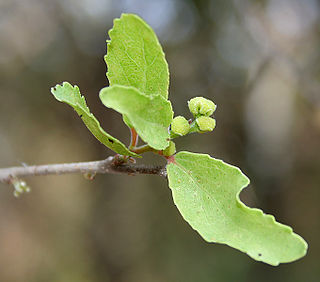
Flacourtia is a genus of flowering plants in the family Salicaceae. It was previously placed in the now defunct family Flacourtiaceae. The generic name honors Étienne de Flacourt (1607–1660), a governor of Madagascar. It contains 23 species of shrubs and small trees that are native to the African and Asian tropics and subtropics. Several species, especially Flacourtia indica, are cultivated as ornamentals and for their fruits. The trunks of small trees are often guarded by branching spines.

The bombing of Bahrain in World War II was part of an effort by the Italian Royal Air Force to strike at the British interests wherever possible in the Middle East. While the mission caused little damage, it was successful in forcing the diversion of already-limited Allied resources to an obscure theater originally thought to be safe.

Dysphania is a genus of plants in the family Amaranthaceae. Species of the genus are found worldwide from the tropics and subtropics to warm-temperate regions.

Bejaria racemosa, commonly known as tarflower, is a woody shrub with a fragrant flower found in the southeastern US states of Florida, Georgia, and Alabama. It grows on flatlands in groups. Insects become trapped on its flowers due to the sticky secretions found there.

Ericoideae is a subfamily of Ericaceae, containing nineteen genera, and 1,790 species, the largest of which is Rhododendron, followed by Erica. The Ericoideae bear spiral leaves with flat laminae. The pedicel is articulated and the flowers are pendulous or erect, and monosymmetric, with an abaxial median sepal. The carpels are free and the anthers lack appendages. The capsule is septicidal.

Sphyrospermum is a genus of flowering plants belonging to the family Ericaceae.
Themistoclesia is a genus of flowering plants belonging to the family Ericaceae.
Cheiloclinium is a genus of flowering plants belonging to the family Celastraceae.
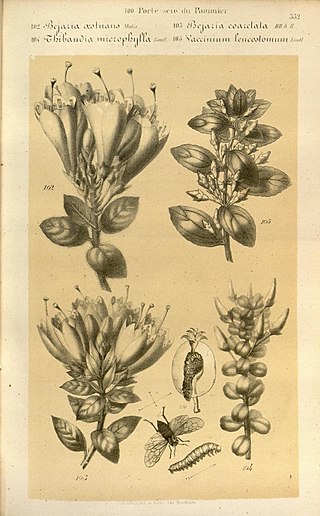
Demosthenesia is a genus of flowering plants belonging to the family Ericaceae.

Plutarchia is a genus of flowering plants belonging to the family Ericaceae.
















